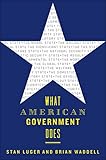What American government does / Stan Luger, Brian Waddell.
Material type: TextLanguage: Spanish Publisher: Baltimore : Johns Hopkins University Press, 2017Description: 385 pages ; 24 cmContent type:
TextLanguage: Spanish Publisher: Baltimore : Johns Hopkins University Press, 2017Description: 385 pages ; 24 cmContent type: - text
- unmediated
- volume
- 9781421422596 (pbk. :acidfree paper)
- 142142259X (pbk. : acidfree paper)
- 320.973 23
- JK 275 L951w 2017
| Item type | Current library | Home library | Collection | Shelving location | Call number | Copy number | Status | Date due | Barcode |
|---|---|---|---|---|---|---|---|---|---|
 Libro
Libro
|
Biblioteca Juan Bosch | Biblioteca Juan Bosch | Automatización y Procesos Técnicos | Automatización y Procesos Técnicos (1er. Piso) | JK275 L951w 2017 (Browse shelf(Opens below)) | 1 | Available | 00000128136 |
Browsing Biblioteca Juan Bosch shelves, Shelving location: Automatización y Procesos Técnicos (1er. Piso), Collection: Automatización y Procesos Técnicos Close shelf browser (Hides shelf browser)

|

|

|

|

|

|

|
||
| JC 578 S214j 2011 Justicia : ¿hacemos lo que debemos? / | JF51 .C758 1988 Constitucionalismo y democracia / | JF 2011 W555 2011 What's left of the left : Democrats and Social Democrats in challenging times / | JK275 L951w 2017 What American government does / | JK 275 R347s 2007 Supercapitalism : the transformation of business, democracy, and everyday life / | JK 468 W619f 2016 Finks : how the CIA tricked the world's best writers / | JK 1759 S628g 2017 The great American citizenship quiz : can you pass your own country's citizenship test? / |
Includes bibliographical references and index.
The significant state -- The tax state -- The welfare state -- The national security state -- The domestic security state -- The regulatory state -- The developmental state -- The moral state.
It has become all too easy to disparage the role of the US government today. Many Americans are influenced by a simplistic anti-government ideology that is itself driven by a desire to roll back the more democratically responsive aspects of public policy. But government has improved the lives of Americans in numerous ways, from providing income, food, education, housing, and healthcare support, to ensuring cleaner air, water, and food, to providing a vast infrastructure upon which economic growth depends. In What American Government Does, Stan Luger and Brian Waddell offer a practical understanding of the scope and function of American governance. They present a historical overview of the development of US governance that is rooted in the theoretical work of Charles Tilly, Karl Polanyi, and Michael Mann. Touching on everything from taxes, welfare, and national and domestic security to the government's regulatory, developmental, and global responsibilities, each chapter covers a main function of American government and explains how it emerged and then evolved over time. Luger and Waddell are careful to both identify the controversies related to what government does and those areas of government that should elicit concern and vigilance. Analyzing the functions of the US government in terms of both a tug-of-war and a collaboration between state and societal forces, they provide a reading of American political development that dispels the myth of a weak, minimal, non-interventionist state. What American Government Does represents a major contribution to the scholarly debate on the nature of the American state and the exercise of power in America


There are no comments on this title.